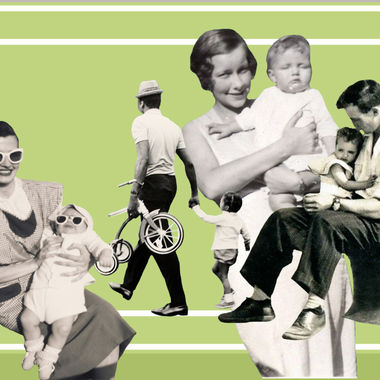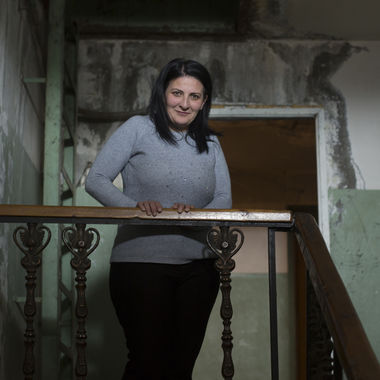Thu Aug 12 2021 · 8 min read
Who Benefits From Comfortable Workplace Environments for Mothers and Babies?

By Astghik Karapetyan

Illustration by Armine Shahbazyan.
"Sometimes I would cradle and nurse my child with one hand, and work with the other. That was our daily routine. My child had already gotten used to the online meetings; first, he would greet everyone, then we would get to work," says Hasmik Aleksanyan, head of youth programs at UNICEF in Armenia, when sharing her experience working from home with a new-born during the pandemic.
She has now returned to working from the office․ "We have the opportunity to bring our child to our workplace and nurse them in a nursing room,” Hasmik explains. “Also, during the period we are breastfeeding, we are able to come to work an hour later, and leave an hour earlier, or to go home two hours early. You can also skip your lunch break to go home earlier. In that sense, the employer is flexible. I decided to go home early.”
Having a designated nursing room at the workplace and flexible working conditions help working mothers to continue breastfeeding after returning to work, keeping the emotional bond between mother and baby uninterrupted․
"It demonstrates that the employer respects their employee's motherhood. You know that, if you need to bring the baby, you have a place where you can nurse them, and be with the baby for at least an hour during the day. I should also mention that I went on a lot of working trips to the regions [outside Yerevan] and my baby came with me; he did not hinder the work at all, although, of course, it was difficult," says Hasmik.
Accommodating workplace environments and policies for women and children have a direct impact on the well-being of the family. Important components of a family-friendly work environment are paid maternity leave, non-discrimination on the basis of pregnancy and marital status, flexible working hours, protection of the right to breastfeeding, and so on.
In Armenia, there are mechanisms in place to provide maternity leave and exclude discrimination (although in some cases violations do occur). However, in the case of encouraging breastfeeding, legal protections are almost non-existent. And Hasmik's example is a positive exception.
Rooms for Childcare and Rest
“Initiation of breastfeeding within the first hour of birth, followed by exclusive breastfeeding for six months and continued breastfeeding for up to two years or beyond offer a powerful line of defence against all forms of child malnutrition, including wasting and obesity. Breastfeeding also acts as babies’ first vaccine, protecting them against many common childhood illnesses,” reads the joint statement from UNICEF and the WHO on the occasion of World Breastfeeding Week, which began on August 3.
The international organizations assert that it is time to prioritize the provision of a comfortable environment that promotes breastfeeding, for the benefit of mothers and their babies. At the same time, it is recommended that employers provide the necessary time and safe place for women to breastfeed, as well as paid parental leave, access to affordable childcare, etc.
One of the most important components of creating a comfortable environment for mothers and their babies is the nursing room or childcare room. There are a number of norms regarding this issue in Armenian legislation:
-
Every child has the right to be breastfed as an optimal, no-alternative means of receiving safe and adequate nutrition.
-
A nursing woman has the right to have appropriate conditions for breastfeeding in workplaces, penitentiaries, healthcare organizations and other public places.
-
The state is taking measures to promote breastfeeding, to protect the rights of nursing women and children.
Law on Promoting Breastfeeding and Regulation of Marketing of Baby Food
According to Article 251 of the Labor Code, the nursing room is also mentioned among the sanitary-hygienic rooms of an organization. At the same time, it should be noted that there are no regulations on when and by what standards these rooms should be furnished and, in practice, it is rarely observed.
The action plan of the Gender Policy Implementation Strategy of Armenia for 2019-2023 envisages the installation of nursing rooms. In particular it mentions that measures will be taken in Yerevan’s higher education and state institutions in 2021-2023, through a pilot program. However, it is not known what the concrete result will be in 2023; there is no clarity as to how many nursing rooms are planned, and in which institutions.
Extra Breaks for Nursing Mothers
Generally, women who have a child up to the age of 18 months are entitled to an additional break of at least one hour. According to Article 258 of the Labor Code, every three hours an additional break of no less than half an hour is provided for nursing the baby.
This norm is also rarely observed. To begin with, few employers have nursing or childcare rooms in the workplace․
"If such a room existed, my nanny would bring my child to me to be fed and then take them back home. Of course, it would be a real luxury if the nanny kept my baby in that room during my working hours. In reality, I was expressing milk in the bathroom because I did not want to wean my baby so soon. I used to store it so that they could feed the baby in my absence," says pharmacist Alina Karapetyan.
Journalist Mane Madoyan believes that the provision of such conditions by the employer will make the life of working mothers much easier, but it all seems an incredible luxury․ "Nursing room? Once the employer provides an adequate toilet, we can think about a nursing room,” Madoyan says. She also talks about the problem of transport; not everyone can afford to travel to and from work by taxi, and one cannot rely on public transportation.
And since a woman cannot physically go home from work, feed the baby and return in 30 minutes, in some cases, with the consent of the employer, the break hours are taken at the end of the day and the employee finishes work an hour early.
Flexible Working Hours
Mane Madoyan remembers that her first child was ten months old when she stopped breastfeeding, the main reason being the unfavorable conditions at her place of study and work that made breastfeeding for longer impossible. Her third child is already one, and she continues to nurse, because she is working from home due to the COVID-19 pandemic.
The coronavirus experience proved that it is possible to do many jobs remotely. And maybe it is time for legislation to also give pregnant women and women caring for young children the right to work remotely, if possible. Currently, the possibility of working remotely is specified only in case of force majeure situations.
Article 141 of the Labor Code stipulates that, at the request of an employee who is pregnant or caring for a child up to the age of one, a partial working day or a partial working week may be established. In this case, the employee is paid in accordance with the actual time spent working or the actual work done.
The State as an Employer
Within the framework of the study "Legal Guarantees and Support Programs for the Protection of Women's Labor Rights in Early Maternity" conducted jointly by Point 33 NGO and the Friedrich Ebert Foundation, inquiries on having nursing rooms and issues related to them were addressed to the offices of the President, the Prime Minister, the National Assembly, 12 ministries and the Health and Labor Inspection body, as it has the authority to oversee the protection of labor rights.
According to the answers received, there are no nursing rooms at any of these institutions. The main argument is that there has never been a need for it or that they have never been approached regarding the matter. Meanwhile, there are women who work and take maternity leave in these institutions, and the provision of a room by the employer can in itself inform the woman of her right and encourage working mothers to continue breastfeeding even after they return to work.
How Does the Employer Benefit?
Organizations that have a comfortable (family-friendly) environment for women and their children have other benefits besides being reputable and attractive to highly qualified staff. Research carried out in Austria demonstrates clear indicators as to why employers should be more family-friendly:
-
Motivation to work increases by 11%
-
Staff turnover decreases by 10%
-
Maternity and childcare leave is short (9%) as employees are more likely to return to work early
-
Absences due to illness are less frequent (on average by 23%)
-
The employee’s loyalty to the company is higher
-
Work efficiency increases by 12%
Family-friendly policies affect the well-being of the family and the decision to have another child. For this very reason, countries with low birth rates utilize not only legislative norms, but also practical programs to encourage employers to provide for a family-friendly environment.
For example, the German government implements the Success Factor Family program, within the framework of which the employer organizes day-care for children of employees between the ages of 0 and 6, and receives funding for this. Childcare is organized in different ways depending on the number and average age of the organization's employees, as well as their needs, such as furnishing childcare rooms, building their own small kindergartens, using third-party childcare services, and so on.
In Portugal, employees with children under the age of 12 have the opportunity to choose part-time or flexible work, while parents with children up to the age of three can request to work from home.
Armenia is among the list of countries with a low birth rate. According to data from the National Statistical Committee, the average birth rate has fallen to 1.5 children/woman in rural areas and 1.7 in urban areas in 2019, from 3․2 in rural areas and 2․3 in urban areas in 1991.
Taking into account the humanitarian turmoil that Armenia experienced in 2020, family-friendly workplaces have become an issue of national security.
Also See
It Has To Be Said: Mother Armenia and the Domestic Gender Gap
By Maria Titizian
The lockdown because of the coronavirus pandemic has ripped the domestic gender gap wide open, laying bare the deep inequity that exists in most families.
Surrogacy and Parenthood in Armenia
By Kushane Chobanyan
Couples who have struggled with infertility, sometimes turn to surrogate mothers to have a child of their own. With continuing economic hardship in Armenia, policymakers and health professionals need to address issues in the current legislation that may leave women who choose to become surrogates vulnerable.
Choosing Contentment
By Sara Stites
This is a story about the beautiful complexity and strength of mothers, especially those raising a child with a disability.
A Room of a Photographer’s Own
Five women photographers confront a conservative cultural ethos by turning the camera upon themselves and thus becoming objects of scrutiny and interpretation.






